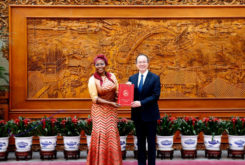China-Africa trade expands, e-commerce makes rapid strides
Since China became Africa’s largest trading partner in 2009, trade has continued to climb, helped by cooperative frameworks put in place by the Chinese government and its African counterparts. The momentum is expected to build over the medium term, and the Beijing Summit of the Forum on China-Africa Cooperation in September is likely to help ensure that these increasingly close economic ties become even closer. Meanwhile, China’s growing investment on the continent has been bolstered by Beijing’s ambitious global trading and investment strategy known as the Belt and Road Initiative. For the time being, this initiative is having a greater impact on East Africa but over time the benefits are likely to be seen in other parts of the continent.
China-Africa trade volumes continue to increase, rising by 19% last year. In the years ahead, e-commerce is expected to propel growth. Countless web entrepreneurs in China are already focusing their attention on the potential of e-commerce in the African trade and investment picture.
Defined as transactions that occur over the internet, e-commerce involves the sale and purchase of goods and services on a website and/or a social media platform. Technology has already sparked some ingenious solutions in Africa, from mobile payments to security crowdsourcing.
Following the celebrated success of MPesa, a mobile phone-based money transfer, financing and microfinancing service, BitPesa was launched as a digital foreign exchange and payment platform. To promote safety and security, authorities are subscribing to popular social media networks and encouraging users to report criminal activity. This is all made possible by the growing accessibility across the continent of affordable smartphones, the majority of which are manufactured in Shenzhen – China’s technology hub.
Even African-owned mobile phone companies, such as 7mobile and Facemundi in Angola, outsource the manufacturing of their devices to partners in China. At the touch of a button, one can digitally access a multitude of Guangzhou’s long-established supply chains for goods and services. The fourth industrial revolution is propelling an upsurge of web entrepreneurs across the globe and now more visibly in Africa.
The rise of African web enterprises
Bypassing the conventional models for setting up a business, e-commerce platforms are gaining popularity. Without the need for large amounts of capital and requiring only a modest corporate infrastructure, small and micro enterprises can import and export goods and services.
Web enterprises in Africa’s Portuguese-speaking countries have customised their navigation tools for their respective niche target markets, taking into account local geography, language, and consumer preferences.
Mozambique’s most prominent web enterprises, for example, offer delivery services in multiple regions around the country. Jumia, a free classified advertising platform, and Compra, an online store, are among the more successful ventures. Similarly, online shopping is gaining ground in Angola, and reshaping consumer trends across the country. Well-known brands in the e-commence space, like Baobabay and Kitandeira, amongst others, feature quality Chinese-made goods for the middle-income customer. 7mobile smartphones are available online at the Soba-Store, an e-commerce platform.
Tech entrepreneurs are also exploring innovative solutions in e-commerce. Tupuca, launched in 2015, is Angola’s first food delivery platform, and it now has some 20,000 users. Its market currently is restricted to Luanda, where users of its mobile app can order food from any of its 120 registered restaurants. The tech startup, winner of the Angolan segment of the Seedstars World competition, plans to expand its portfolio to include grocery and pharmacy deliveries.
Adding more dimensions to e-commerce, online social networks are also setting new benchmarks for trade. Countless web enterprises and web entrepreneurs, source their merchandise from China, then advertise the products on social media platforms like Facebook and Instagram.
Chinese businesses are connecting the dots
As e-commerce gains traction throughout Africa, Chinese investors are recognising its immense potential. Leading the way is Alibaba, the flagship of e-commerce success in China. In order to improve access to e-commerce opportunities, Alibaba’s Electronic World Trade Platform partnered with the World Trade Organization and World Economic Forum to launch the “Enabling E-Commerce” initiative.
Founder and executive chairman Jack Ma used his visit to Kenya last year to announce the launch of a US$10 million African Young Entrepreneurs Fund.
Founder and executive chairman Jack Ma used his visit to Kenya last year to announce the launch of a US$10 million African Young Entrepreneurs Fund, which he declared would be used to support African online businesses. Through strategic partnerships with universities, Ma shared his plans to build capacity in internet technology, artificial intelligence and e-commerce. These are key elements that will contribute towards breaking down barriers to tapping market potential.
First, internet access is an essential component to enabling e-commerce. According to Internet Live Statistics, the total number of internet users in Angola and Mozambique is estimated at 5.9 million and 1.8 million, respectively.
Second, the postal system and courier companies need to provide more reliable and affordable services. Mirroring its role in bilateral trade overall, China is the key source of products purchased in e-commerce transactions in Angola. China is Angola’s largest trade partner and Mozambique’s fourth largest trade partner. However, e-commerce is changing the rules of global trade, prompting regulators to fast-track the effort to reduce trans-border obstacles. For developing countries, much like those mentioned above, new rules need to be created on cross-border data flows, data storage, digital signatures, the protection of source codes, and privacy.
Third, the online payment facility requires shoppers to possess a credit card. However, this is not readily available in Angola or in São Tomé and Principe, for instance. Therefore, a growing number of online shopping sites and services are accepting alternative payment methods via ATM, POS machines and internet banking. Hence, African countries need to recognise the importance of narrowing the digital gap and promoting digital development.
Chinese enterprises mark a path for future Chinese investors
Since China UnionPay International launched its operations in Mozambique in December 2017, UnionPay cardholders have been able to make purchases in the country using China’s credit infrastructure. Africa is one of China’s fastest-growing outbound tourism destinations, and Mozambique is positioning itself as a preferred destination. UnionPay has given Chinese tourists and enterprises greater purchasing capacity, as they can now also surf the web and tap into Mozambique’s budding e-commerce platforms. In fact, UnionPay’s card services network in Africa has grown rapidly; it is already established in 50 African countries. The investment needed for this kind of market penetration is typically propelled by a cooperation agreement brokered by the Chinese government.
On a tour of Africa in January this year, China’s Foreign Minister, Wang Yi, visited two Lusophone countries — Angola and São Tome and Príncipe. Wang pledged his country’s continued support for closer economic ties and called on Chinese enterprises to invest in these markets. Such rhetoric mirrors the observations of a gradual shift in Chinese foreign direct investment and trade in Lusophone Africa from mega projects to entrepreneurial ventures.
The sharp drop in oil prices since 2008 has hammered Angola’s oil-based economy and revealed grave fiscal mismanagement. Hence, the Angolan government has commissioned fewer contracts; hundreds of Chinese projects have been halted, and thousands of Chinese workers have left the country. Even at Luanda’s grandiose international airport, an ambitious project on the outskirts of the capital city, all work has been halted indefinitely.
For the Chinese companies whose businesses operate outside of the public sector, a looming financial crisis has presented a new set of challenges. The Central Bank of Angola has imposed stringent currency controls and commercial banks have had limited access to foreign exchange. That is hampering imports of all kinds. The shortage of US dollars has also prompted a growing demand for euros. Meanwhile, the Angolan currency (AOA) continues to depreciate, with an official exchange rate that is nearly half the informal market rate. This has made it especially difficult for the business sector to import goods.
When the Bank of China entered the Angolan market last year, it was initially hoped that this would boost imports from China by circumventing problems from a shortage of dollars in the domestic economy through direct currency exchanges between the AOA and China’s renminbi. Alas, the Chinese state-run bank has been subject to the same rules and regulations as all other international banks, such as South Africa’s Standard Bank and Russia’s VTB, which facilitate trade with their home country but through the use of dollars or euros.
The Chinese community in Angola has found an innovative solution online, however. Through WeChat, China’s most versatile mobile application, the local community created a brokering platform for trading currencies. Since the unofficial rate for the AOA generally prevails, new investors in Angola are able to take advantage of the more favorable rate.
During the Chinese foreign minister’s visit to Angola last year, the two countries signed an agreement to waive certain visa requirements for general passport holders. This move is set to increase the volume of Chinese business tourism in Angola, with an additional objective of attracting foreign direct investment in the manufacturing sector. For the near term, however, trade is expected to dominate China-Africa economic relations, particularly amid the growing ranks of Chinese enterprises and entrepreneurs looking to optimize their entry into African markets through e-commerce.




